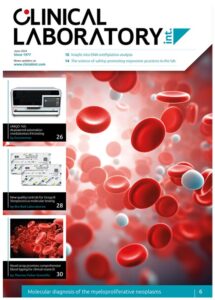Tillotts Pharma and TVM Capital Life Science form Mage Biologics to develop oral antibody therapy for ulcerative colitis
TVM Capital Life Science, a leading international venture capital firm focused on investments in life sciences innovation, together with specialty pharma company, Tillotts Pharma, will jointly invest up to US$28 million in the newly formed U.S.-based biotechnology company, Mage Biologics. TVM will invest with its fund TVM Life Science Innovation II SCSp (TVM LSI II) and will provide strategic advice to Mage Bio, with Dr Sascha Berger, General Partner, joining the Board of Directors and Dr Ivan Shaw, Principal, serving as a Board Observer. Mage Bio is the 10th early-stage or project-focused company investment for TVM LSI II.
Mage Biologics plans to advance to clinical proof of concept a novel, orally administered, humanized monoclonal antibody (mAb) bioengineered for optimal potency and tissue penetration. The mAb has been developed by Tillotts and originated from a discovery collaboration with Swiss biotech company Numab Therapeutics. Utilizing Tillotts’ innovative sustained release approach, the antibody is designed to enable release of the drug in the appropriate area of the intestinal tract at a predetermined rate to address inflammation locally and optimally. Initially, the drug will be developed for the treatment of ulcerative colitis. Manufacturing of clinical-grade material is planned to start in 2023, with the goal of filing a clinical trial application in 2024.
Johannes Spleiss, Head of Scientific Affairs at Tillotts and CEO of Mage Biologics, commented: “We are taking a new and potentially disruptive approach to overcome the challenges with traditional ulcerative colitis treatments with this oral antibody. Developing more efficacious therapies with a greater likelihood of success and less systemic side effects is an important step in continuing to innovate for the many patients living with this condition. I look forward to advancing our antibody to clinical proof of concept.”
Ulcerative colitis (UC) is an inflammatory bowel disease that impacts millions of people worldwide. Ulcerative colitis affects the innermost lining of the colon and the rectum, causing inflammation and ulcers in the digestive tract. In most people, symptoms usually develop over time, taking a relapsing-remitting course, which means that periods of flare-ups are followed by periods of remission. This can be draining and, in some cases, lead to life-threatening complications. While there is no known cure, current treatments aim to reduce signs and symptoms of the disease and bring remission. Over the last decade, biologics have gained an important place in the treatment of ulcerative colitis, with several monoclonal antibodies available as subcutaneous or intravenous therapies approved for use in UC. Unfortunately, a substantial proportion of patients do not respond, lose response, or develop intolerance to currently marketed products, leading to a substantial unmet medical need for safer, effective, and more convenient therapeutic options.




